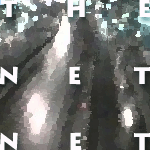Reading Kathy Acker requires a surrender, a willingness to dive into the flow of her prose and not clutch at passing fragments of narrative. At its best, its shattered logic evokes the twistiness of dreams, the oddity of words and symbols that collide on the underside of the mind.
In her less controlled moments Acker veers towards the exhibitionistic or
self-indulgent or merely braggardly, as when she namechecks Diamanda Galas
or R.E.M. or natters on about motorcycles. It seems she can't resist
reminding us that she isn't merely a novelist but is also an avant-garde
media darling. Acker is Cool and we can't be allowed to forget
that -- there's a companion CD to the book in which songs by the Mekons are
intercut with Acker reading from the novel, and she's is on tour with the
band as I write. (The CD, also called
Pussy, King of the Pirates,
is reviewed by AjD in this issue of the net net.)
Acker's prose, in its recursive and omni-referential postmodern cunning,
begs for a complex critical dissection which would be impossible in a brief
review. She is a professor and it shows, both in her postmodern style and
the crudity and luridness of what she depicts. Acker is a literate bad girl
and never tires of flaunting both her grasp of literary theory and the high
style of her reading, and the relish and she obviously has for low-life
scenes and raunchiness. But in trying to mate the two she often falls on
her face.
Acker wants us to believe she knows and understands low life, but her comic
reverence for the "punk boys" and her high-style literary prostitute
characters betray her wide-eyed innocence. Of course they're dream-punks
and dream-whores and the literary excuse is that they are not intended to
be the real thing, but using such high-voltage ideas in an etiolated
literary mode bleaches them of all danger. For all its trappings of sex,
death, dirt and freudian confessions, this book never stops being a mind
game, never becomes physical, never makes the pulse quicken for danger or
for eros.
On the literary side of the coin, calling a character O doesn't
automatically invoke the erotic solemnity of Pauline Reage, nor does
mentioning Orpheus or Antigone conjure the weight and magic of myth.
Borrowing themes and names is sometimes an effective technique, but Acker
tacks these names onto her text as if merely saying the names is to bless
her work with the mana of the ancestors. Whether she refers to myth,
literature or low life, it seems Acker is trying to borrow others' finery
to dress up her text, and the cumulative effect is more like an overwrought
little girl in fancy dress than a serious writer who would cut a stylish
dash among her peers.
There's no summarizing the plot of Pussy, King of the Pirates. Plot is
irrelevant, the unifying force of the book being more a dream-vision than
anything so pedestrian as a story line. Nonetheless, the novel keeps
hinting that it would like to be an Orphic underworld descent and return,
but its progress is too scattered to achieve the cathartic closure of that
classic form. It's like the kind of dream where you keep planning to do
something and keep being distracted or frustrated and the recurring mention
of the "bottom of the world" and of images of falling turns the Orphic
motif into the textual equivalent of a tape loop.
To send characters to hell and back becomes an empty exercise when there's
little to choose between the gruesomeness of the characters' ordinary
daylight life and the particulars of the pirate island hell world. When in
Sadeian style all that is painful or disgusting has already been defined as
pleasure, what's left to indicate the depths of damnation? Acker seems to
think it has something to do with being physically dirty or sickly, mostly,
and the moral weight of the horrors of hell is outside the book's scope.
In fact, even to talk of characters in Pussy is almost too concrete. The
book is a hypnotic trance piece in which the characters stand more as
aspects of the author's psyche than as separate creations who make a claim
on existence apart from the author. It's a 90s rock version of Woolf's The
Waves which may not be something we needed, but here it is, a cracked
crystal held up to refract shifting aspects of an intense psyche. Whether
you want to peek in is your own business.
Pussy gets points for the S. Clay Wilson endpaper illustration, and loses
them again for the illegible diagrams and maps scattered through the book.



